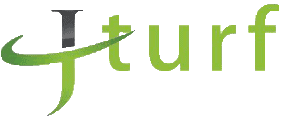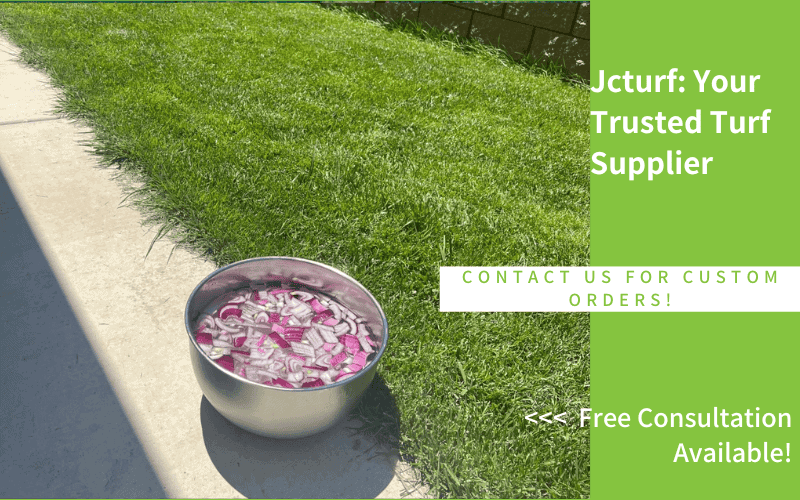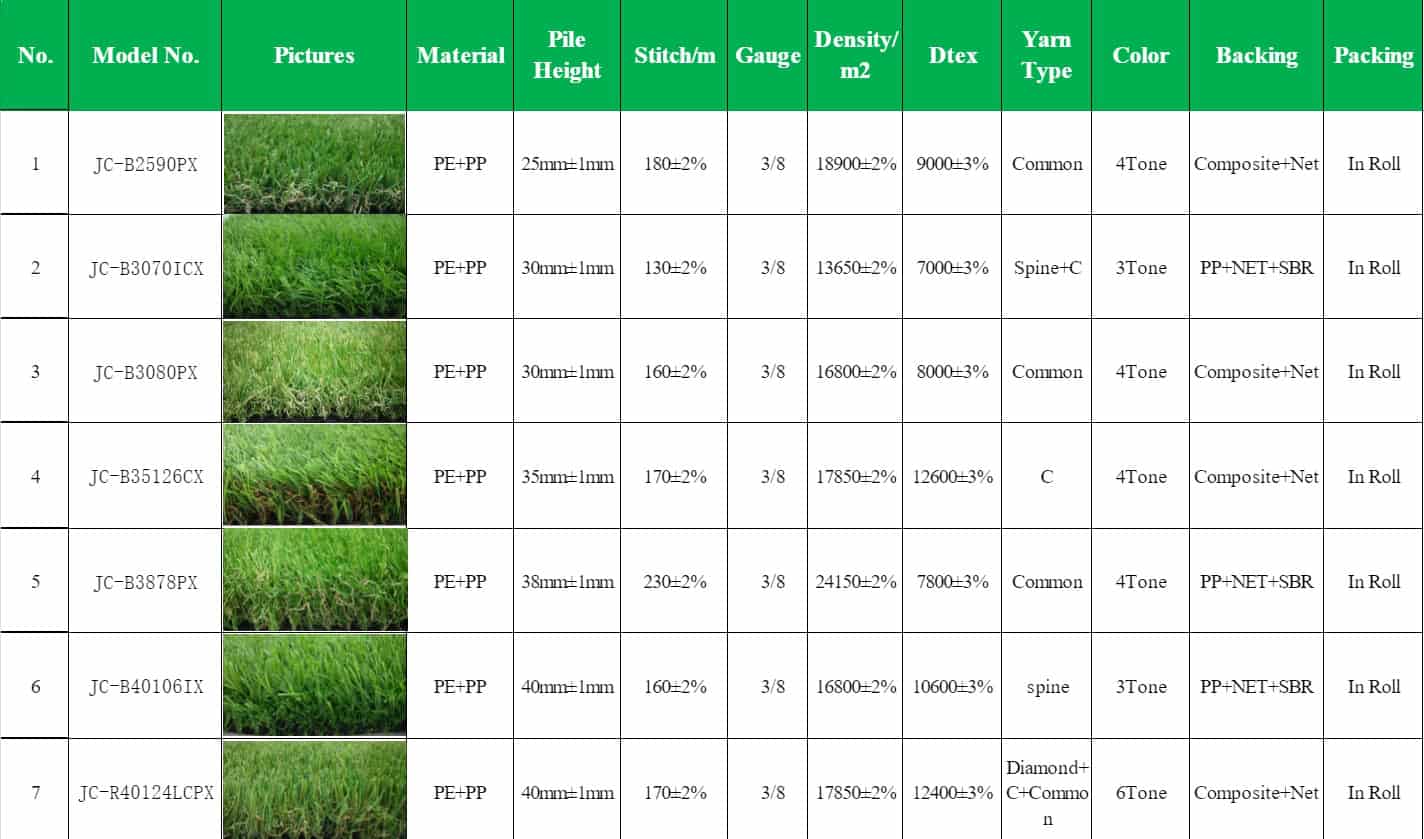If your artificial turf smells, it’s likely due to a few common causes like pet urine, poor drainage, or lack of maintenance. The good news is that deodorizing your turf is simple and manageable. In this article, we’ll answer why your artificial grass may have an unpleasant odor and show you how to freshen it up with easy-to-follow methods.
We’ll cover practical tips on how to deodorize artificial grass, prevent odors from returning, and even address specific settings like pet areas, yards, and poolside turf. Whether it’s a quick refresh or deep cleaning, we’ve got the solutions you need to keep your turf smelling fresh all year long.
Why Does My Artificial Turf Smell?
If your artificial turf smells, understanding the causes can help you tackle the problem. Several common factors contribute to unpleasant odors, and addressing them early can keep your turf fresh.
Pet Urine: Especially from dogs, is a primary cause of odor on artificial grass. Unlike natural grass, artificial turf doesn’t absorb liquid, so urine can sit on the surface or seep into the turf, causing a strong ammonia-like smell. Bacteria in the urine amplify this odor, particularly in warm, humid conditions.
Poor Drainage: When water accumulates on the surface and doesn’t drain properly, it creates a breeding ground for mold and mildew, which emit a musty smell. If your turf lacks a proper drainage system or is clogged with debris, the moisture can become trapped, leading to odors.
Lack of Proper Airflow and Maintenance: A lack of airflow and regular maintenance can also cause your turf to smell. Moisture and organic debris can get trapped, fostering bacterial growth.
Does Artificial Grass Smell After Rain?
Yes, artificial grass can smell after rain if there’s poor drainage. Excess moisture trapped in the turf promotes bacteria and mold growth, creating unpleasant odors.
How to Deodorize Artificial Grass?
Deodorizing artificial grass keeps it fresh and pleasant. Here’s a concise guide based on practical methods:
Regular Cleaning:
- Remove Debris: Sweep or rake leaves, dirt, and pet hair using a stiff brush or leaf blower.
- Hose Down: Rinse the turf with a garden hose to wash away dust and minor odors. Use a mild soap solution (like dish soap mixed with water) for deeper cleaning, then rinse thoroughly.
Neutralize Odors:
- Vinegar Solution: Mix equal parts white vinegar and water in a spray bottle. Apply to odorous areas, let sit for 10-15 minutes, then rinse with water. Vinegar neutralizes pet urine and other smells.
- Baking Soda: Sprinkle baking soda over the turf, let it sit for 15-20 minutes, then brush it in or rinse off. It absorbs odors effectively.
- Enzyme Cleaners: Use pet-safe enzymatic cleaners for stubborn pet urine odors. Follow product instructions, typically spraying and letting it dry.
Deodorizing Products:
- Apply commercial turf deodorizers. These are often granule- or spray-based and designed for artificial grass. Follow the product’s application guidelines.
- For pet-heavy areas, use infill-specific deodorizers, which can be brushed into the turf.
Preventive Maintenance:
- Pet Waste: Promptly remove solid waste and rinse urine spots with water to prevent odor buildup.
- Aeration: Brush the turf regularly to prevent matting and improve airflow, reducing trapped odors.
- Sun Exposure: Allow the turf to dry completely after cleaning, as moisture can foster bacteria and odors.
Deep Cleaning (Periodic):
- Use a power washer on a low setting for thorough cleaning, ensuring not to damage the turf backing.
- For heavy odors, consider professional cleaning services that use specialized equipment and deodorizing solutions.
Tips:
- Avoid harsh chemicals like bleach, which can damage the turf or harm pets.
- Test cleaning solutions on a small area first to ensure they don’t discolor the grass.
- Maintain proper drainage to prevent water pooling, which can cause odors.
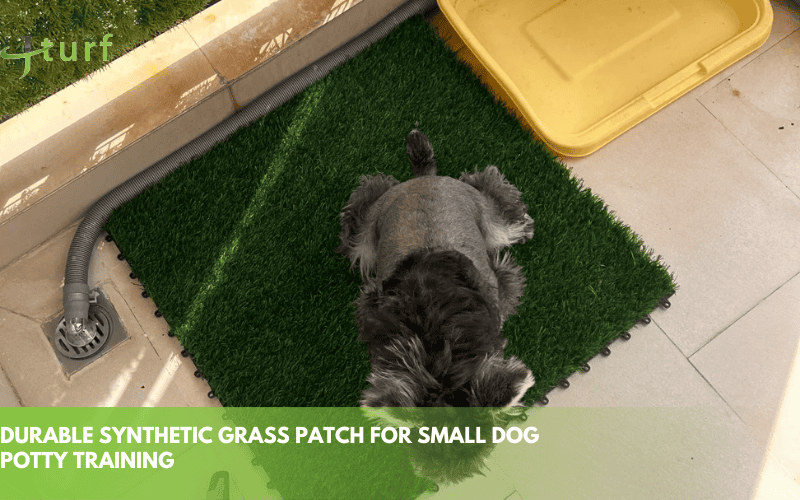
How Do You Clean Artificial Turf with Baking Soda?
- Apply a substantial amount of baking soda liberally over the odorous sections of your turf.
- Leave it undisturbed for 15–20 minutes so the baking soda can effectively soak up the smell.
- Gently brush the baking soda into the fibers of the turf to ensure even distribution.
- Rinse the area thoroughly with water to wash away the baking soda.
Will Baking Soda Neutralize Dog Urine on Fake Grass?
Yes, baking soda can effectively neutralize dog urine odors. It absorbs the ammonia from the urine, helping to reduce the smell. However, for strong or persistent odors, you may need to repeat the process or combine it with other cleaning methods.
Does Vinegar Get Rid of Dog Urine Smell on Turf?
Yes, vinegar can help get rid of dog urine smells. The acetic acid in vinegar neutralizes the ammonia in urine, effectively reducing odors.
Will Vinegar Damage Artificial Grass?
- No, vinegar will not damage artificial grass if used correctly. It’s a natural cleaner that’s safe for turf. Make sure to dilute it with water to avoid any potential issues with long-term use.
How to Deodorize Artificial Turf Naturally
To naturally deodorize artificial turf, use a combination of baking soda and white vinegar. These ingredients are both effective and safe for turf. Regular maintenance, such as ensuring proper drainage and cleaning, will also help maintain a fresh scent.
Best Deodorizer for Artificial Turf
The best deodorizer for artificial turf is an enzymatic cleaner. By breaking down odor-causing organic materials, such as pet urine, these cleaners are both effective and safe for use on turf and around pets. They are also biodegradable, making them an environmentally friendly option.
Best Artificial Grass Cleaner for Dog Urine
For dog urine specifically, enzyme-based cleaners are the best choice. By breaking down the uric acid in urine, these cleaners effectively neutralize the odor where it starts. Choose a biodegradable, pet-safe option for the best results.
How to Freshen Up Artificial Turf?
To freshen up artificial turf, start with a few simple steps that focus on cleaning and deodorizing.
Remove Debris: Brush off leaves and dirt with a stiff broom or leaf blower to prevent buildup.
Rinse Thoroughly: Spray the area with a garden hose to remove dust, pollen, and light stains.
Spot Clean Stains: For spills or pet accidents, blot immediately and use mild soap with water.
Deodorize Naturally: Sprinkle baking soda, let it sit, then rinse to neutralize odors.
Disinfect if Needed: Spray diluted vinegar or hydrogen peroxide for deeper sanitation.
Fluff the Fibers: Gently brush the turf to restore its natural appearance.
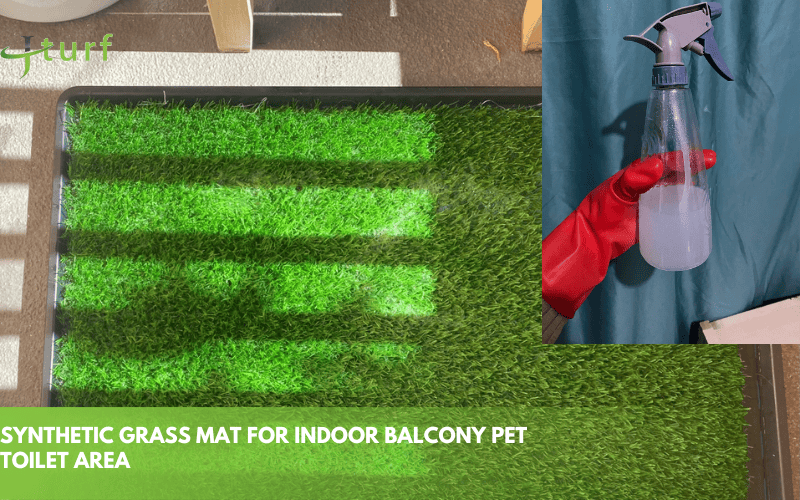
How to Make Artificial Turf Smell Better
Achieving a quick refresh can be as effortless as spraying a blend of water and a couple of drops of essential oils, such as lemon or eucalyptus. For stronger odors, an enzyme-based cleaner breaks down organic residues without harming the turf.
What Can I Put on Grass to Get Rid of Dog Urine Smell?
Enzyme cleaners are the most effective—they target urine compounds rather than just masking the smell. Apply generously, let it soak, and rinse after 10-15 minutes.
Best Homemade Dog Urine Repellent: Combine equal amounts of white vinegar and water in a spray bottle, and then incorporate a tablespoon of citrus juice into the mixture. Lightly mist areas where your dog frequently goes—the acidic scent helps deter repeat marking.
Using an Artificial Turf Cleaner Machine: For large or heavily used areas, a turf cleaner machine saves time and effort. These devices combine brushing, sanitizing, and rinsing in one pass, making them ideal for sports fields, pet runs, or high-traffic backyard spaces.
Deodorizing Turf in Different Settings
Different environments require specific approaches to keep artificial turf smelling fresh and clean. Here are the best practices for deodorizing turf in various settings.
How to Deodorize Artificial Turf Around Dogs
For dog-friendly turf, use enzymatic cleaners to break down urine compounds. Rinse immediately after accidents and apply a deodorizer like a baking soda-water paste (let sit for 10 minutes before rinsing) or commercial enzyme sprays. Weekly deep cleaning with a vinegar-water solution (1:3 ratio) helps prevent lingering odors.
How to Deodorize Artificial Turf in Yard
For yard turf, sweep debris weekly and hose down monthly. Sprinkle cornstarch or baking soda, let sit for 20 minutes, then brush off. For organic smells, spray diluted hydrogen peroxide (1:4 with water) and rinse. Ensure proper drainage to avoid stagnant water under the turf.
How to Deodorize Artificial Turf Around Pool
Poolside turf collects chlorine, sunscreen, or algae odors. Rinse daily with fresh water to remove chemicals. Use mild detergent for grease stains, and treat mildew with a 50/50 white vinegar-water spray. Avoid harsh chemicals that can damage turf fibers or pool water balance.
How to Deodorize Artificial Turf on Football Fields and Golf Courses
High-traffic sports turf requires professional-grade solutions:
Football fields: Use turf sanitizer machines with non-toxic disinfectants between games.
Golf courses: Apply granular deodorizers specifically designed for putting greens to avoid affecting ball roll.
For both, aerate infill periodically to prevent compacted odor traps.
Note: Always test cleaners on a small area first.
Artificial Turf Supplier for Odor-Free Outdoor Spaces
As a leading artificial turf supplier and manufacturer, we offer durable, easy-to-maintain turf that is perfect for any setting, from landscape lawns to sport turfs. Whether you’re dealing with pet odors, yard maintenance, or high-traffic areas, our products are designed to stay fresh and durable.
If you’re looking to invest in long-lasting, odor-free artificial turf, explore our wide range of turf products designed for various applications. We offer tailored solutions to meet your needs. Don’t let odors compromise your outdoor space—choose JCturf for premium, odor-resistant artificial turf.
